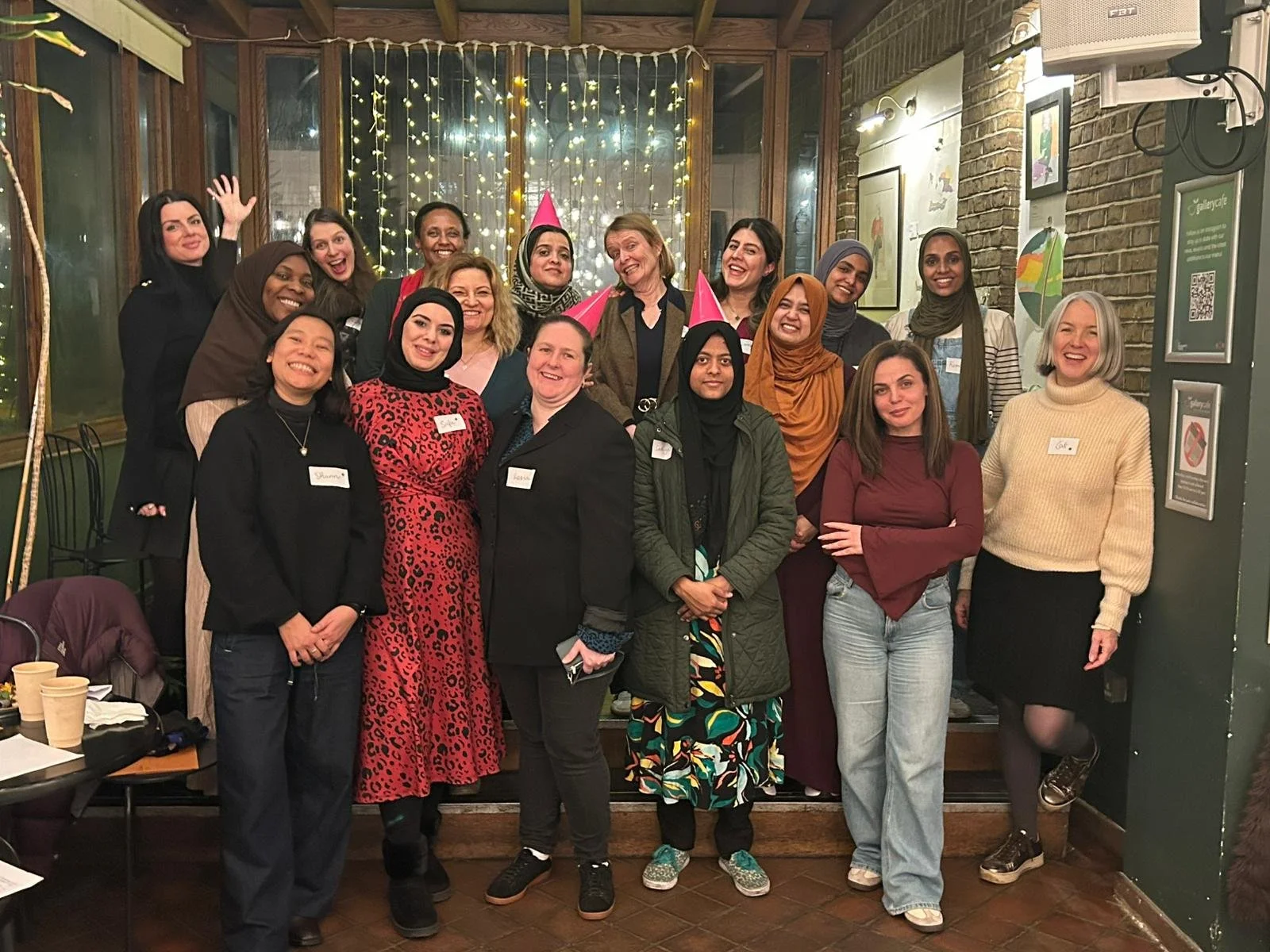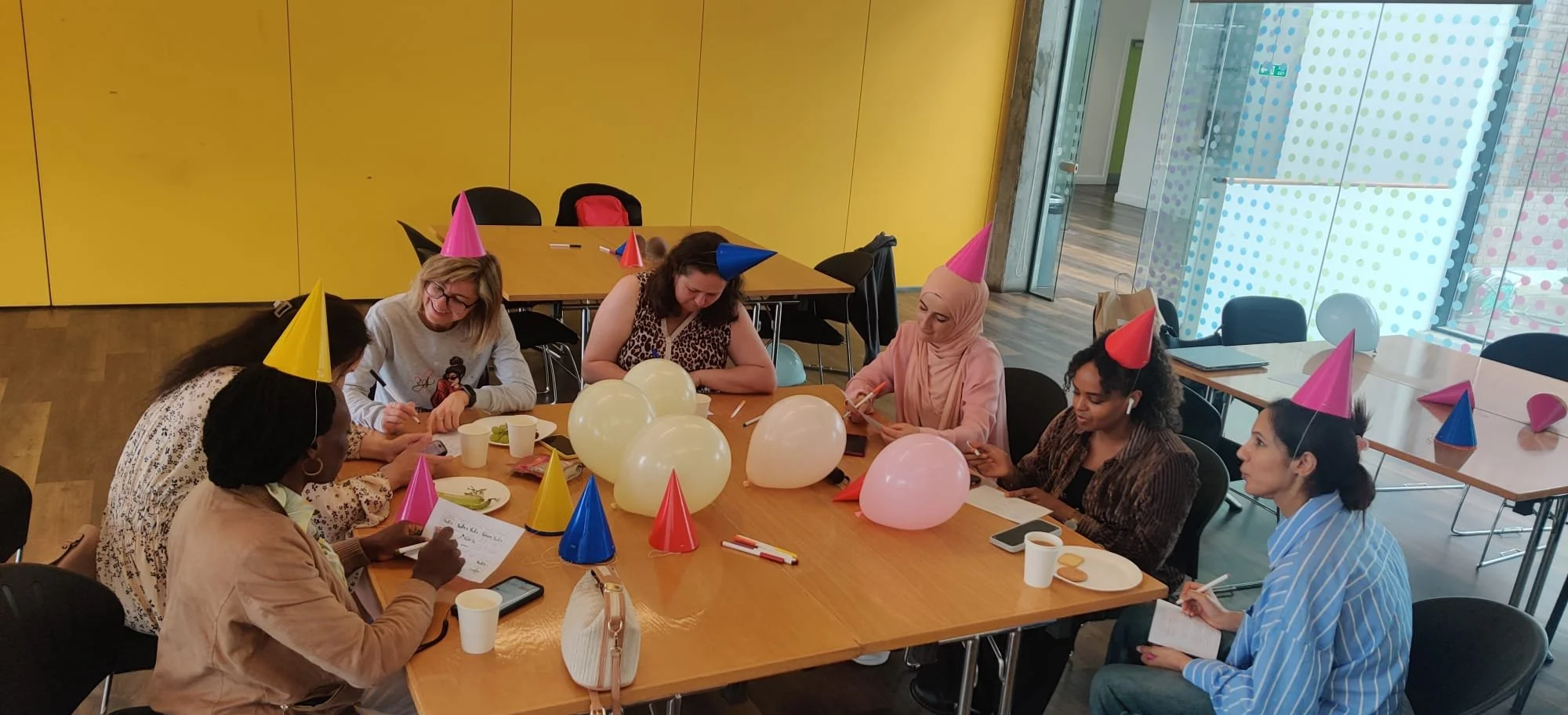Refugee Week 2024: 'Our Home', resilience and the Hostile Environment
In June, it’s Refugee Week in the UK - and this year’s theme is ‘Our Home’. Refugee Week is organised annually and is the world's largest arts & culture festival celebrating the contributions, creativity and resilience of refugees and people seeking sanctuary. In this blog compiled by Routes’ Head of Programmes Wieke Vink, we share reflections from across the internet on what ‘Our home’ might mean in different contexts - and invite you to learn more about the implications of the UK’s Hostile Environment and the resilience of refugees.
Photo: Banner from the Routes Banner Making Workshop (June 2024). The text on the banner reads ‘Home is where I live in peace and safe’. You can read more about the Banner Making Workshop here.
Imagining home
If you feel comfortable, close your eyes for a second and think of ‘home’. What do you see? What do you hear? What do you feel? What do you smell? Who is with you in your home - and who is perhaps kept out? Home can mean many things for different people - and often, people don’t just have one place they consider ‘home’.
It should be acknowledged that if you feel comfortable to close your eyes and think of home, likely you are in a position of privilege of some sorts. In the world, there are only a lucky few who can claim an uncomplicated relationships with home - a place of comfort, and nostalgia perhaps. A place of choice.
Many of us do not have the choice to be home, to reach home, or to be safe at home.
Leaving home
One of the most well-known contemporary poems on leaving home is ‘Home’ by Warsan Shire. The famous first lines read: ‘No one leaves home / unless home is like the mouth of a shark / you only run for the border / when you see the whole city running as well’. The poem takes us through messy journeys, past airport toilets, to refugee camps and prisons and people shouting insults and ‘Go home.’ The final stanza speaks in the sweaty voice of home itself: ‘Run away from me now / I don’t know what I’ve become / But I know that anywhere / Is safer than here.’
(You can read the full poem here on the website of Amnesty International Ireland. If you can, please consider supporting the work by the artist Warsan Shire by buying one of her poetry collections).
House versus home
As Tasneem Dahous - participant of the Araqa Collective - writes on Instagram: ‘In English, ‘house’ refers to the physical structure where I live, made of concrete, tents, or wood. ‘Home, on the other hand, includes intangible elements like memories, warmth, and emotional connections with loved ones. (…) I no longer create the same kind of memories, amongst displacement and uncertainty. This is the price of conflict between major powers and political ambitions that have stolen each of us the seed of hope and the ray of light that was burning.’ Araqa Collective invites their participants, who have experience of seeking safety, to reflect on the meaning of home in arts workshops they organise in the Bekaa Valley in Lebanon.
Meanwhile, in a video on Instagram, Morgan Cooper reflects on what it means to leave home if you don’t know if you will be able to return. Morgan is an American woman living with her Palestinian husband and their two children in Ramallah on the Palestinian Westbank. They are preparing for a trip to London for Eid celebrations. Her family is able to travel, as she describes, but living on the Westbank means that for any trip they will have to pack up their house as if it were the last time they would see it, as it might be. The rules, imposed by Israel, for Palestinians on the Westbank are strict and leave people with a huge amount of uncertainty.
Whilst responding to her child in the background, she talks to us from her kitchen, reflecting on the significance of the olive oil on her kitchen sink. Morgan addresses both the rules her family and neighbours are subject to, and her strong awareness that - as a Palestinian family - it is a strange experience to even be able to consider the possibility of potentially returning home relatively safe. Her Instagram is well-worth a visit, as she speaks up for a free Palestine and stands in solidarity with Gazans and Palestinians elsewhere.
(You can read Routes' statement and poem calling for a ceasefire from October 2023 here.).
Home in the Hostile Environment
What does ‘home’ mean in light of the UK’s Hostile Environment? When people from refugee backgrounds arrive in the UK and apply for asylum here, it is incredibly difficult for many to re-build a sense of home. This is often due to the ways the asylum system is designed. For example, thousands of asylum-seeking children are being housed in crowded hostels and hotels for lengthy periods of times - without access to sufficient healthy food, places to play and other things that might help you feel at home. The UK has also been using barges and barracks that are unfit for purpose, and have been described as ‘prison-like’ - causing suffering, further trauma and mental health risks for those forced to live there. And what does ‘Our Home’ mean when there is a constant threat and real risk of detention, and even the physical surroundings you find yourself in are not safe and not certain? In this blog, a former client from the organisation Freedom from Torture describes how it impacted her to have to live with the constant fear of the Government’s Rwanda Plans. Her piece was written before the shock detention operations that we saw in April 2024, ahead of the UK’s local elections - and that have further impacted those at risk of detention and removal to Rwanda.
Whilst detention has been a strong component of the recent Rwanda Plans (You can read Routes’ statement on the passing of the Rwanda Bill here), it is important to acknowledge that the use of detention as part of the UK asylum system is nothing new. The UK has been using detention as part of the immigration and asylum-system for a long time, creating significant harm and risk of life to those subjected to this ‘policy’ measure. The UK is also the only country in Europe that works with ‘indefinite detention’, meaning people can be put in detention centres indefinitely, with no release dates given and no judicial review processes.
Reimagining ‘Our Home’
In all the media frenzy and the urgency of support on a case-by-case basis, it is important to remember that seeking asylum is a human right. In the Universal Declaration of Human Rights from 1948 - one of the first international human rights documents from after the Second World War - it is stated in Article 14: ‘Everyone has the right to seek and to enjoy in other countries asylum from persecution.’ Whilst we currently see a trend towards a hardening of refugee policy in different parts of Europe, it doesn’t have to be like this - and we all have a responsibility to speak up for human rights if we are safe and able to do so.
The Joint Council for the Welfare of Immigrants has recently published a manifesto outlining five core components for migrant justice: rights, safety, dignity, justice and community. In conversation with other sector organisations, privacy was added as another important component outlining six steps to migrant justice. These are being shared far and wide, for people to be able to reimagine what a fair immigration system and society might look like - and take them into consideration when they vote.
Because yes, it’s election time! If you are eligible to vote, you have until Tuesday 18th June to register. People with Leave to Remain (many refugees), people who are asylum-seekers and some other migrants are not able to vote themselves. As such, if you call the UK your home and are able to vote, you have an important say in who gets to make decisions on the UK’s laws and policies. You can also have a look at this resource by City of Sanctuary on what to say when a political canvasser knocks on your door.
Recommendations from Routes for Refugee Week 2024
Reflect on what the theme ‘Our Home’ means to you, and what you might want to do in the coming weeks to make that vision for a shared home more of a reality in your neighbourhood, your workplace, and in the UK as a whole.
Follow the organisation Araqa Collective on Instagram, as they share more reflections on the theme ‘Our Home’ during Refugee Week. Araqa Collective is an organisation providing arts workshops to people who are displaced and currently based in the Bekaa Valley in Lebanon.
Head to Hoxton Street (London) on Wednesday 19th June, for an evening of songs and poetry. The night ‘Ceasefire Songs & Poetry for Peace’ is hosted to raise funds for Gaza and Sudan. Anyone is welcome to share a song, a poem, or to just join in and listen to the evening’s contributions.
More music! Head to the Migration Museum (London) on Friday 21st June for a free performance during lunchtime by the Sounds Like Home Choir.
Have a look at the calendar for Refugee Week here. There are many more activities being organised, online and across the country.
Sign up to the Routes Newsletter here, to stay up-to-date with the work that we do and developments in the sector. We share monthly suggestions for learning and action, that are relevant for anyone wanting to take steps - big and small - to speak up for refugee rights.
Apply to the Routes Mentoring Programme. Applications for mentors and mentees are open now for our autumn 2024 cohort (deadline 7th July)! The Routes Mentoring Programme is designed as an immersive learning experience, in which mentors and mentees learn from each other. Mentors join Routes to learn about inclusive leadership, communication skills and the UK asylum system, as they support a mentee from a refugee background to work on their personal and professional goals.
With the theme of Refugee Week 2024 being ‘Our Home’, it is we who create ‘Our Home’ together, even though not all of us have equal opportunities to do so. We invite everyone in our network to use this Refugee Week 2024 to learn, share and stand in solidarity with everyone with experience of displacement.






